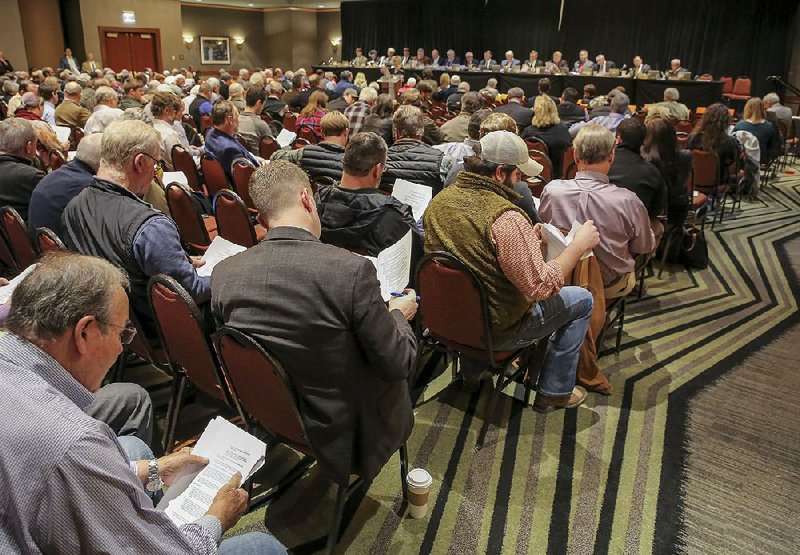Robert Campbell, a state Plant Board member recently reappointed by Gov. Asa Hutchinson to represent the livestock industry, missed six of the board's 12 meetings in 2019 but didn't run afoul of state law governing board members' attendance.
Arkansas Code 25-17-211, which is part of state law on the operations of almost all state boards and commissions, cites absence from "three successive regular meetings without attending any intermediary called special meetings" as grounds for potential removal of a board member.
Campbell missed three consecutive meetings -- on Oct. 23, Nov. 14, and Dec. 3, according to attendance records at the Plant Board, which is a part of the state Department of Agriculture. Two of the three, however, were special meetings called by the chairman. Campbell is from Witts Springs, in Searcy County.
Hutchinson on Dec. 31 announced Campbell's reappointment to a new two-year term.
State boards and commissions generally meet just quarterly.
The Plant Board, however, has met 30 times since January 2017, primarily to deal with dicamba, a herbicide linked to thousands of complaints of damage to crops and vegetation across much of the state. Twenty-one of those meetings were special ones, called by its chairman, or public hearings that often lasted for hours.
Campbell didn't return recent telephone calls or respond to an email request for comment.
Kyle Baltz of Pocahontas, also appointed by Hutchinson, missed five of the 12 meetings in 2019. "I just had a lot of obligations, I just tried to fulfill everything," Baltz said Thursday, noting his absences were of special meetings called on a few days' notice. Baltz represents farmers at large.
Members' participation by a telephone conference call generally is allowed and is counted as attendance. The seven meetings attended by Baltz in 2019 included one in which he participated by telephone.
Plant Board members, like those of most state panels, receive no salary but are reimbursed for mileage.
Baltz and Campbell accounted for 11 of the cumulative 23 absences in 2019 by the 16 members who have voting privileges. Hutchinson's five other appointees on the board missed a cumulative two meetings during 2019. Three of those five -- John Fricke of Pine Bluff, Sam Stuckey of Clarkedale and Barry Walls of Harrisburg -- had perfect attendance.
Nine members are appointed by agriculture groups, such as those that represent seed dealers, seed growers, aerial applicators, foresters and pesticide manufacturers. Those nine members together had 10 absences during 2019, with none of those having more than two.
Marty Eaton of Jonesboro, Terry Fuller of Poplar Grove, Dennie Stokes of Earle, Russell Black of Fayetteville and chairman Greg Hay of Conway didn't miss a meeting. (Stokes and Black left the board in October, when their terms expired, having attended the six meetings held to that date.) All 16 members are still active in their careers.
Two other members, representing the University of Arkansas' Agriculture Division, don't have voting privileges.
Hutchinson, through spokeswoman Katie Beck, said Wednesday that he wasn't aware of any complaints about attendance of his appointees and that "the Plant Board is functioning well and fulfilling its duties." Campbell's reappointment was made, and justified, because "we verified his overall performance," Hutchinson said.
Secretaries of boards and commissions are required to notify the governor's office of absences that may violate law. "It happens rarely," Hutchinson said. "We appreciate the thousands of public-minded citizens that serve on our boards and commissions."
Campbell also missed a Dec. 30 meeting, the day before his reappointment was announced.
Hay called that meeting for the board to decide whether to appeal a circuit judge's decision a few days earlier that the state law allowing trade groups to name representatives to the board was unconstitutional. The board voted 13-0 to appeal the ruling to the Arkansas Supreme Court. Baltz also missed that meeting. Hay, as chairman, didn't vote.
Baltz also missed two Plant Board formal hearings on whether farmers committed "egregious" violations of Arkansas pesticide law, with possible fines of up to $25,000 per violation. Campbell missed one of the two. Participation by telephone wasn't allowed in those meetings.
Baltz, Campbell and three other members also missed a special meeting in Keiser, in Mississippi County, in late July, which was called by Hay four days earlier for members to inspect dicamba damage at a UA experiment station.
Campbell missed three of nine Plant Board meetings in 2018 and two of nine in 2017.
Hay, the board's chairman, said he hasn't directly heard any complaints about members' absences, but has heard "scuttlebutt" of discontent.
"It's very important they take seriously their responsibilities as a member and to make those meetings on a regular basis," Hay said. "I do know that some of these folks have quite a ways to drive. They make every effort to make those meetings, and I'm very appreciative of that. From Fayetteville or Lewisville, from the Delta and out of Jonesboro, those are hauls."
Witts Springs, southwest of Marshall, is about a two-hour, 110-mile drive to Plant Board headquarters in west Little Rock, with about half of it along scenic but winding roads. At about 160 miles, Russell Bragg of Fort Smith and Jerry Hyde of Paragould have the longest drives.
For 12 voting members who have drives of more than an hour into Little Rock, the average trip is 129 miles. Four members have drives of less than 45 minutes, from Pine Bluff, England, Conway and Scott.
The workload of the board isn't likely to let up, Hay said, citing dicamba as an ongoing concern and industrial hemp as a program that will attract more of the board's attention. "We need members present for a quorum and to show there's a solid representation of the board always around as we discuss the issues and make decisions that affect Arkansas agriculture," he said.
Business on 01/17/2020

